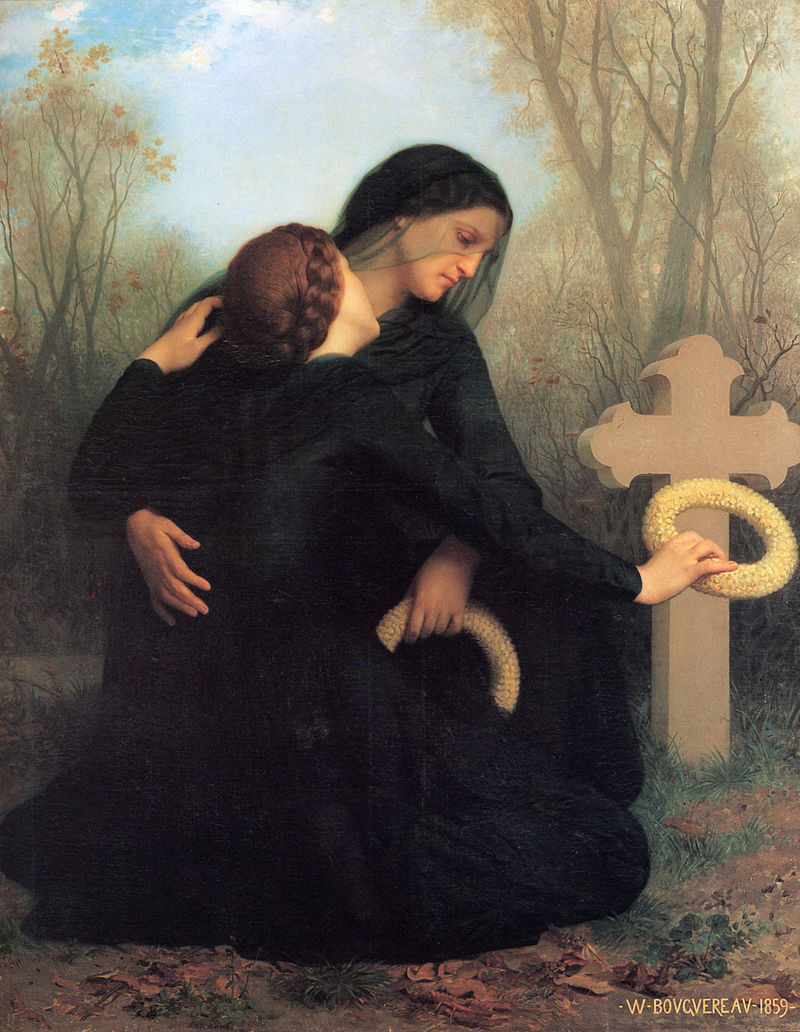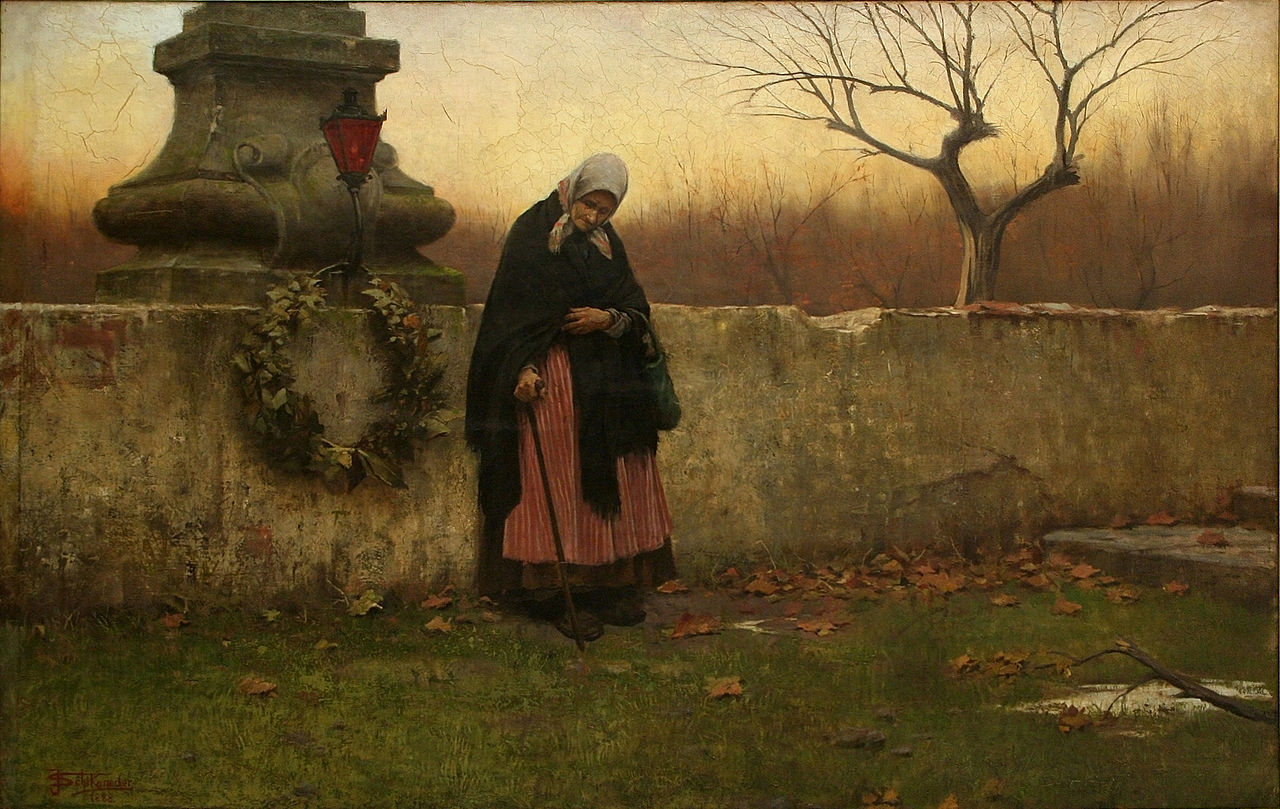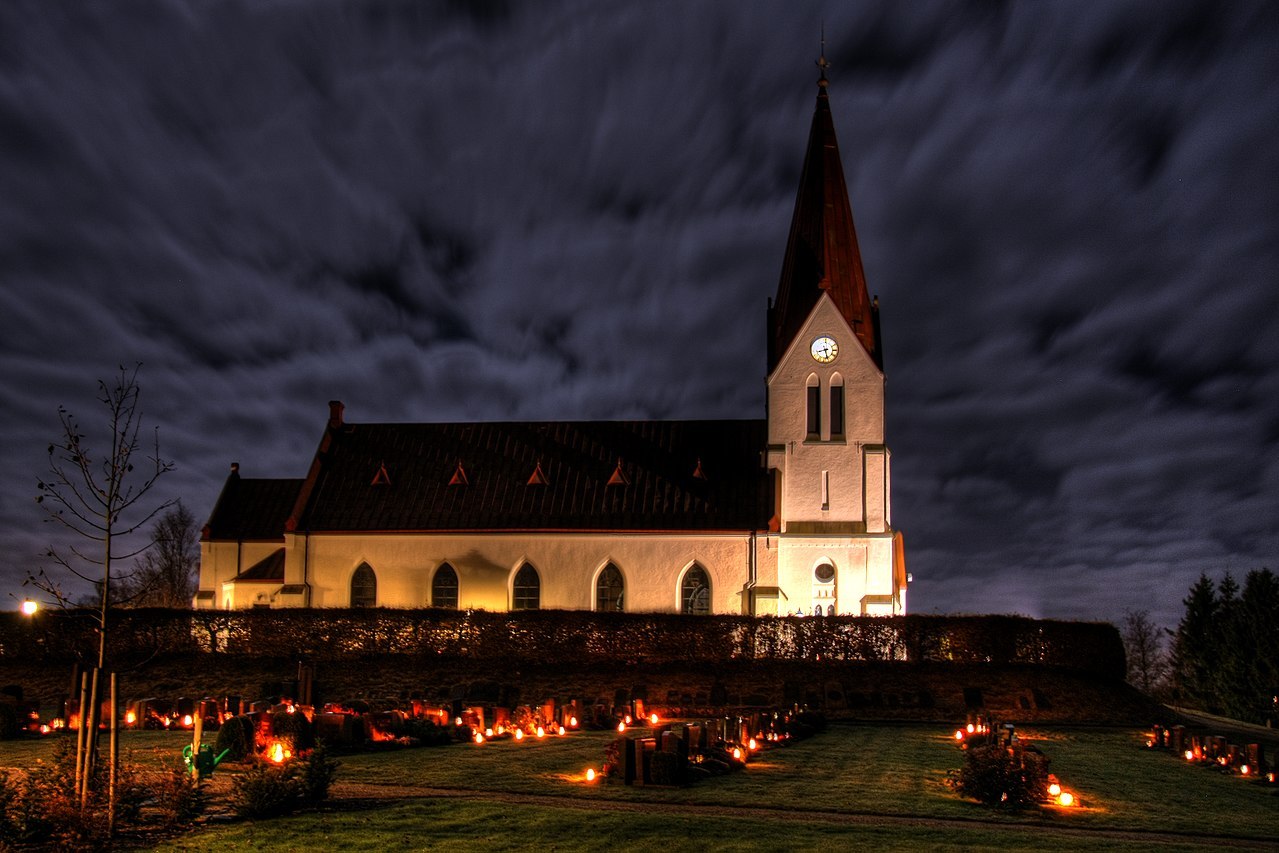All Souls' Day
November 2nd
🥀🙏🏻💐🙏🌺🙏🏾🌷🙏🏻💐🙏🥀🙏🏾🌹

All Souls’ Day by William-Adolphe Bouguereau


🥀🙏🏻💐🙏🌺🙏🏾🌷🙏🏻💐🙏🥀🙏🏾🌹

All Souls’ Day by William-Adolphe Bouguereau
🥀 🙏🏻 🙏 🙏🏾 🌷 🙏🏻 🙏 🙏🏾 🌷
Also called Feast of All Souls; Defuncts' Day; Day of Remembrance; Commemoration of all the faithful departed
Observed by Catholicism , Eastern Orthodoxy , Lutheranism, Anglicanism , Methodism , Other Protestant denominations
- Liturgical Color: Violet/purple or, where customary, black
- Significance: For the souls of all good who have passed away
- Observances: Prayer for the departed, visits to cemeteries, special meals


In some Christian denominations, All Souls' Day or the Commemoration of All the Faithful Departed, that is, of the souls of all Christians who have died, follows All Saints' Day. Observing Christians typically remember deceased relatives on the day.
In Western Christianity the annual celebration is held on 2 November and is associated with the season of Allhallowtide, including All Saints' Day (1 November) and its eve, Halloween (31 October). In the Catholic Church, "the faithful" refers specifically to baptized Catholics; "all souls" commemorates the church penitent of souls in Purgatory, whereas "all saints" commemorates the church triumphant of saints in Heaven. In the liturgical books of the western Catholic Church (the Latin Church) it is called the Commemoration of All the Faithful Departed (Latin: Commemoratio omnium fidelium defunctorum), and is celebrated annually on 2 November.
In the ordinary form of the Roman Rite, as well as in the Personal Ordinariates established by Benedict XVI for former Anglicans, it remains on 2 November if this date falls on a Sunday; in the 1962−1969 form of the Roman Rite, use of which is still authorized, it is transferred to Monday, 3 November. On this day in particular, Catholics pray for the dead. In the Church of England
it is called The Commemoration of the Faithful Departed and is an
optional celebration; Anglicans view All Souls' Day as an extension of
the observance of All Saints' Day and it serves to "remember those who
have died", in connection with the theological doctrines of the resurrection of the body and the Communion of Saints.
In the Eastern Orthodox Church and the associated Eastern Catholic Churches, it is celebrated several times during the year and is not associated with the month of November.
Beliefs and practices associated with All Souls' Day vary widely among Christian churches and denominations.

All Souls' Day, painting by Jakub Schikaneder, 1888
Background
The Catholic Church teaches that the purification of the souls in Purgatory can be hastened by the actions of the faithful on earth. Its teaching is based also on the practice of prayer for the dead mentioned as far back as 2 Maccabees 12:42–46.
In the West there is ample evidence of the custom of praying for the dead in the inscriptions of the catacombs, with their constant prayers for the peace of the souls of the departed and in the early liturgies, which commonly contain commemorations of the dead. Tertullian, Cyprian and other early Western Fathers witness to the regular practice of praying for the dead among the early Christians. The theological basis for the feast is the doctrine that the souls which, on departing from the body, are not perfectly cleansed from venial sins, or have not fully atoned for past transgressions, are debarred from the Beatific Vision, and that the faithful on earth can help them by prayers, alms deeds and especially by the sacrifice of the Mass. Because Purgatory is outside of time and space, it is not necessarily accurate to speak of a location or duration in Purgatory.
History
In the sixth century, it was customary in Benedictine monasteries to hold a commemoration of the deceased members at Whitsuntide. According to Widukind of Corvey (c. 975), there existed a time-honoured ceremony of praying to the dead on 1 October in Saxony. But it was the day after All Saints' Day that Saint Odilo of Cluny chose when in the 11th century he instituted for all the monasteries dependent on the Abbey of Cluny an annual commemoration of all the faithful departed, to be observed with alms, prayers, and sacrifices for the relief of the suffering souls in purgatory. Odilo decreed that those requesting a Mass be offered for the departed should make an offering for the poor, thus linking almsgiving with fasting and prayer for the dead. From there the 2 November custom spread to other Benedictine monasteries and thence to the Western Church in general. The Diocese of Liège was the first diocese to adopt the practice under Bishop Notger (d. 1008).
In the 15th century the Dominicans instituted a custom of each priest offering three Masses on the Feast of All Souls. During World War I, given the great number of war dead and the many destroyed churches where mass could no longer be said, Pope Benedict XV, granted all priests the privilege of offering three Masses on All Souls Day, a permission that still stands.
Known as the Commemoration of All the Faithful Departed, in some countries the celebration is known as the "Day of the Dead".

Liturgical practice
In the Roman Rite as revised in 1969, if 2 November falls on a Sunday, the Mass is of All Souls, but the Liturgy of the Hours is that of the Sunday. However, public celebration of Lauds and Vespers of the Dead with the people participating is permitted. While celebration of a Sunday, a solemnity or a feast of the Lord replacing a Sunday begins on the previous evening with Vespers and perhaps evening Mass, the general norms do not allow for anticipation on Saturday evening of the liturgy of All Souls' Day falling on a Sunday, and so they suggest that the formula of the Mass on that Saturday evening is that of the solemnity of All Saints, which outranks the Sunday of Ordinary Time whose Mass would be celebrated on that evening. However, in 2014, the United States Conference of Catholic Bishops decided that for that year the Saturday evening (Sunday vigil) Mass in that country was to be that of All Souls; in countries such as Italy the situation was less clear.
In countries where All Saints' Day is not a holy day of obligation attendance at an evening Mass of All Saints on Saturday 1 November satisfies the Sunday obligation. In England and Wales, where holy days of obligation that fall on a Saturday are transferred to the following day, if 2 November is a Sunday, the solemnity of All Saints is transferred to that date, and All Souls Day is transferred to 3 November. In pre-1970 forms of the Roman Rite, still observed by some, if All Souls Day falls on a Sunday, it is always transferred to 3 November.
In Divine Worship: The Missal the minor propers (Introit, Gradual, Tract, Sequence, Offertory, and Communion) are those used for Renaissance and Classical musical requiem settings, including the Dies Irae. This permits the performance of traditional requiem settings in the context of the Divine Worship Form of the Roman Rite on All Souls Day as well as at funerals, votive celebrations of all faithful departed, and anniversaries of deaths.
All Souls' indulgence
According to The Enchiridion of Indulgences, An indulgence, applicable only to the souls in purgatory, is granted to the faithful, who devoutly visit a cemetery and pray for the departed. The indulgence is plenary, under the usual conditions, each day from the first to the eighth of November; a partial indulgence is granted on any other days of the year.
"Visit to a Church or Oratory on All Souls Day. PLENARY INDULGENCE. A plenary indulgence, applicable ONLY to the souls in purgatory, may be obtained by those who, on All Souls Day, piously visit a church, public oratory, or -for those entitled to use it, a semi public oratory. It may be acquired either on the day designated as All Souls Day or, with the consent of the bishop, on the preceding or following Sunday or the feast of All Saints. On visiting the church or oratory it is required that one Our Father and the Creed be recited.":N.15



Some believe that the origins of All Souls' Day in European folklore and folk belief are related to customs of ancestor veneration practiced worldwide, through events such as, in India Pitru Paksha, the Chinese Ghost Festival, and the Japanese Bon Festival. The Roman custom was that of the Lemuria.
The formal commemoration of the saints and martyrs (All Saints' Day) existed in the early Christian church since its legalization, and alongside that developed a day for commemoration of all the dead (All Souls' Day). The modern date of All Souls' Day was first popularized in the early eleventh century after Abbot Odilo established it as a day for the monks of Cluny and associated monasteries to pray for the souls in purgatory.


In Tirol, cakes are left for them on the table and the room kept warm for their comfort. In Brittany, people flock to the cemeteries at nightfall to kneel, bareheaded, at the graves of their loved ones, and to anoint the hollow of the tombstone with holy water or to pour libations of milk on it. At bedtime, the supper is left on the table for the souls.
In Malta, a traditional All Souls supper includes roasted pig, based on an All Souls’ Day custom where the Maltese feasted on a pig let loose on the streets with a bell hanging around its neck. Entire neighborhoods would feed it, and on the day cook it to feed the poor.
In Linz, funereal musical pieces known as aequales were played from tower tops on All Soul's Day and the evening before.










No comments:
Post a Comment